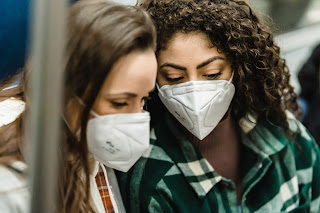dry cough
tiredness
Less common symptom
sore throat
body ache
loss of taste or smell
skin rash
headache
The immune system fights off foreign pathogens, such as viruses and bacteria. Specialized immune cells, called B-lymphocytes identify antigens on the surface of invading cells. When a B cell detects a new antigen, it causes the production of proteins, called antibodies, that bind to antigens.Once an antibody locks onto an antigen, it attracts other cells that destroy the target. When B cells produce a new antibody, they can continue making the same antibody if the same antigen appears in the future. This is called adaptive immunity. Some diseases, like measles, can only infect us once but our body’s immune system produces antibodies that ward off any future infections. Naturally, millions of people who’ve recovered from COVID-19 over the past year hope the same might be true for this virus.But the research is ongoing and definitive answers are hard to come by.
Theoretically, people who get COVID-19 should develop corresponding antibodies. However, it is difficult to say at this stage how these antibodies will respond to a future infection.
Immunity offers protection that extends beyond the individual level. When sufficient individuals have developed an effective antibody response, additional benefits such as “herd immunity” become a possibility.
Herd Immunity
Herd immunity occurs when a certain percentage of a population develops immunity to an infectious disease.
Herd immunity not only protects those who are not immune, but it can also slow down and even stop the spread of infectious diseases.
- The majority of the population contracts the disease and generates a corresponding immune response.
- Many people receive inactive or weak strains of the disease through vaccination.
- A combination of both ways above occur.
Allowing the majority of the population to contract the virus could lead to hundreds of thousands of deaths.
Older individuals and those with chronic health conditions have a higher risk of developing severe, life-threatening symptoms of COVID-19.Survivors of the corona virus are less likely than the rest of population to catch novel corona virus.But the risk of reinvention is not zero.
Researchers conclude reinfection is uncommon but still possible and say people must continue to follow current guidance, whether they have had antibodies or not.
Scientists from Hong Kong recently reported on the case of a young, healthy man who recovered from Covid-19 only to be re-infected more than four months later. Using genome sequencing of the virus, they could prove he caught it twice because the virus strains were different.
Experts say re-infection isn't surprising, but it's likely to be rare, and larger studies are needed to understand why this might happen.
Recent study led by by Public Health England (PHE) shows most people who have had the virus are protected from catching it again for at least five months.Some are reinfected, however even if asymptomatic, can then harbour high levels of the virus in their noses and mouths, which can be passed on to others.
also suggested levels of antibodies that kill coronavirus waned over the three month study.
But even if antibodies disappear, then the cells that manufacture them, called B cells, may still be around. B cells for Spanish Flu have been found in people 90 years after that pandemic.If it is same with covid then a second infection would be milder than the first.
Will commom Cold give Immunity against Corona Virus?
Laboratory tests show the T cells some people made to fight Sars or common cold coronaviruses can also react against the new coronavirus.How common this is and how
much protection it gives is still unknown.
Jason Nehmad, medical director at Southern Ocean Medical Center says,“We can test survivors for COVID-19 antibodies, but I don’t think anyone can answer yet how long they last in your body and how protected you are.”
Scientists have already conducted numerous studies examining antibody production in former COVID-19 patients, but early data suggests any immune protection against the virus might be short-lived. According to the National Institutes of Health, “longer-lasting” antibodies might persist for about four months, but much more research is needed.
After getting a COVID-19 vaccine, will I testpositive for COVID-19 on a viral test?
None of the authorized and recommended COVID-19 vaccines cause you to test positive on viral tests, which are used to see if you have a current infection.
If your body develops an immune response to vaccination, which is the goal, you may test positive on some antibody tests. Antibody tests indicate you had a previous infection and that you may have some level of protection against the virus. Experts are currently looking at how COVID-19 vaccination may affect antibody testing results?
Aren’t antibodies enough to protect me?
Dr.Englund says,“We don’t know how long your immunity will last after you’ve had a natural COVID-19 infection."
She says recent research focused on how long immunity lasts after having COVID-19 is unclear, and scientists believe it could be up to eight months. But, she clarifies:“The study to determine that information included only 200 patients, so there’s not a whole lot of data yet. And the best way to ensure you’re protected is to get vaccinated.”
How long should you wait to be vaccinated if you’ve had COVID-19?
The time frame that is recommend for being vaccinated after having a COVID-19 infection is as soon as you’re out of quarantine.If you’ve received monoclonal antibodies, you must wait 90 days after recovering from COVID-19 to receive the vaccine. According to the Food and Drug Administration (FDA), monoclonal antibodies are proteins made in a laboratory that mimic your body’s immune response.If you’ve had that monoclonal antibody, it is going to keep you from being able to develop a nice, robust response to the vaccine. So that’s why we have to wait for 90 days until that monoclonal antibody has gotten out of your system.
What are the chances of being reinfected with COVID-19 if you don’t get vaccinated?
“We’re not seeing very many secondary infections,” says Dr. Englund. But she says it’s also relatively early on in the pandemic. Scientists are still learning about coronavirus, and if you’ve had the virus and aren’t vaccinated, it’s unclear how long it will take before you can be reinfected with COVID-19.
“It’s much better to get yourself vaccinated. Then you don’t have to worry moving forward until we learn more about whether we need booster shots or not,” Dr. Englund clarifies.
Can you still pass the virus to others even if you’ve been vaccinated?
Researchers are currently studying whether someone who’s been vaccinated can carry the virus and pass it on to others.
“It’s looking like the vaccine actually cuts down on the transmissibility of the virus. So if you’ve been vaccinated, there’s much less likelihood that you’re going to get exposed to the virus and be able to pass it on to others.”
She clarifies that some of the early data has not been peer reviewed yet, although it has been published. So researchers are still finalizing this information. But she says early research indicates that being vaccinated for COVID-19 can make you 90% less likely to have an asymptomatic infection and transmit the virus to those around you.
“It looks like the vaccine truly is not only protecting you, but it is protecting those around you."



Great informative article. May Allah bless you with more knowledge to serve humanity. God bless you.
ReplyDeleteThank you ghazal baji.plz share by post.
DeleteGreat informative article. May Allah bless you with more knowledge to serve humanity. God bless you.
ReplyDeleteGreat informative article. May Allah bless you with more knowledge to serve humanity. God bless you.
ReplyDeleteVery nicely written mona ; informative yet digestable for everyone 🙌🏼
ReplyDeleteThx dear
Delete